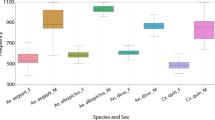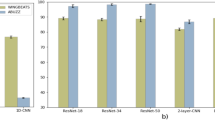Abstract
Dengue fever is one of the most important mosquito-borne disease in the world. To avoid its spread, it is necessary to detect accurately and quickly the infected Aedes mosquitoes and eliminate them. Under the hypothesis of the change of behaviors of the mosquitoes when they are infected by dengue virus, we proposed a discrimination scheme of the infected mosquitoes from the healthy ones using their wingbeat signal. We constructed acoustic chamber in which a condense and omnidirectional microphone capture sthe wingbeat signal as clear as possible under the noisy environment. The proposed scheme is based on Long-Short Term Memory (LSTM) neural networks with two LSTM layers and two Fully-Connected (FC) layers. Time-frequency representation of wingbeat signal is used as input data. We identified the Spectogram, among several time-frequency representations, as the best input data for this task. Some hyperparameters of LSTM-based proposed system are adjusted after several trials. The discrimination accuracy obtained by the proposed scheme is approximately 89.35%, which is 5% better than the previously proposed method based on machine learning techniques such as K-Nearest Neighbor (KNN) and Support Vector Machine (SVM).
Access this chapter
Tax calculation will be finalised at checkout
Purchases are for personal use only
Similar content being viewed by others
References
CDC Homepage about Dengue. https://cdc.gov/dengue/about/index.html
Pan American Health Organization, weekly epidemiological update for dengue, chikungunya and zika in 2022. https://ais.paho.org/PAHOArboBulletin2022.pdf. (in Spanish)
Xiang, B., et al.: Dengue virus infection modifies mosquito blood-feeding behavior to increase transmission to the host. Proc. Natl. Acad. Sci. U.S.A. 119(3) (2021)
Mendez-Luzi, P., et al.: Potential impact of a presumed increase in the biting activity of dengue-virus-infected Aedes aegypti females on virus transmission dynamics. Mem. Inst. Oswaldo Cruz 106(6), 755–758 (2011)
Lima-Camara, T., et al.: Dengue infection increase the locomotor activity of Aedes aegypti female. PLOS ONE 6(3), e17690 (2011)
Fanioudakis, E., Geismar, M., Potamitis, I.: Mosquito wingbeat analysis and classification using deep learning. In: Campisi, P. (ed.) Proceedings of 26th European Signal Processing Conference, Rome, Italy, 3–7 September 2018, pp. 2410–2413 (2018)
Toledo, E., et al.: LSTM-based mosquito genus classification using their wingbeat sound. In: Fujita, H. (ed.) Proceedings of New Trends in Intelligent Software Methodologies, Tools, and Techniques, Cancun, Mexico, 21–23 September 2021, pp. 293–302 (2021)
Mukundarajan, H., Hol, F., Castillo, E., Newby, C., Prakash, M.: Using mobile phones as acoustic sensors for high-throughput mosquito surveillance. eLife 6, e27854 (2017)
Haro, A., Nakano, M., Cime-Castillo, J., Lanz-Mendoza, H., Gonzalez-Lee, M., Perez Meana, H.: Infected mosquito detection system using spectral analysis. Front. Artif. Intell. Appl. 355, 669–677 (2022)
Acknowledgements
Marco Haro wishes to thank the National Council for Humanity, Science, and Technology (CONAHCyT) of Mexico for their support during the development of this research.
Author information
Authors and Affiliations
Corresponding author
Editor information
Editors and Affiliations
Rights and permissions
Copyright information
© 2024 The Author(s), under exclusive license to Springer Nature Switzerland AG
About this paper
Cite this paper
Haro, M., Nakano, M., Torres, I., Gonzalez, M., Cime, J. (2024). LSTM-Based Infected Mosquitos Detection Using Wingbeat Sound. In: Calvo, H., Martínez-Villaseñor, L., Ponce, H. (eds) Advances in Soft Computing. MICAI 2023. Lecture Notes in Computer Science(), vol 14392. Springer, Cham. https://doi.org/10.1007/978-3-031-47640-2_13
Download citation
DOI: https://doi.org/10.1007/978-3-031-47640-2_13
Published:
Publisher Name: Springer, Cham
Print ISBN: 978-3-031-47639-6
Online ISBN: 978-3-031-47640-2
eBook Packages: Computer ScienceComputer Science (R0)




